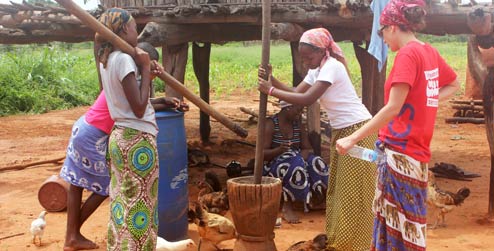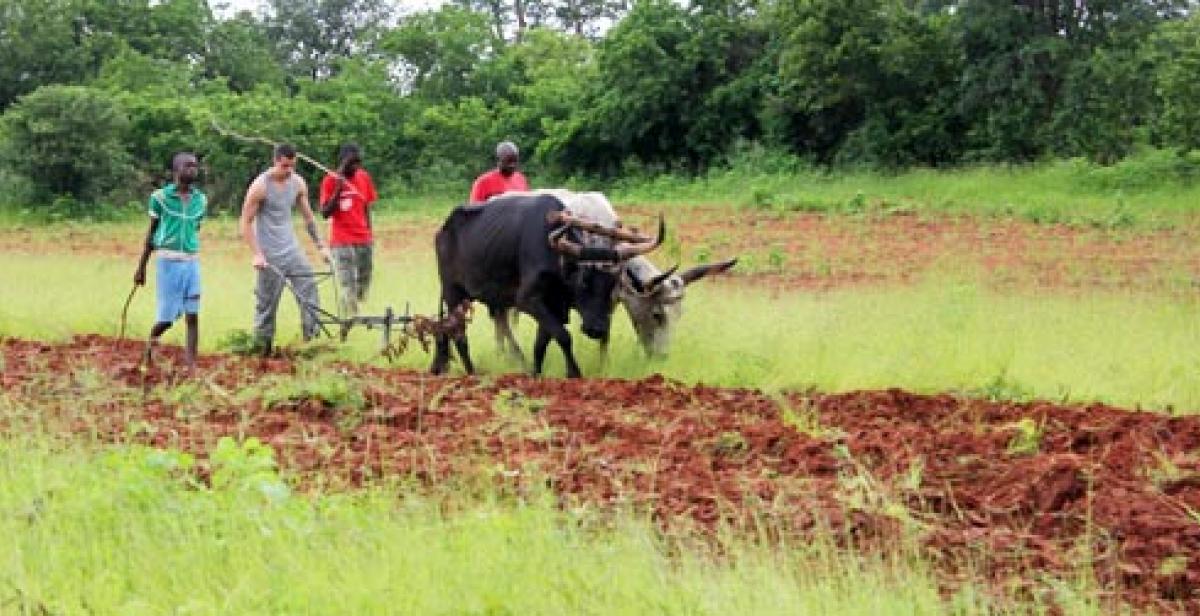To gain an insight into the lives and routines of the people in rural Binga, we, the UK and Zimbabwean volunteers, recently spent the weekend in a small, traditional village; not as visitors, but as part of the family - thereby working, eating and living as part of the community.
Saturday
We arrived late on Saturday and were introduced to the head man of the village; a man dressed modestly in casual sportswear. He gave us a warm welcome, then let us take a walk around the village and introduce ourselves to people there.
Visitors are usually welcomed by the residents so, Tondorai, one of the national volunteers, did a fine job introducing us in formal Tonga to the people of each hut we walked past. Most of the men were out at work, whilst the women had stayed to maintain the homestead.

One of the first things to become apparent here was the gender gap. As soon as we were greeted by the head man, the 8 of us were separated into two groups; one for the boys and one for the girls. After introductions, the men were invited to lunch in the ‘Chipala’ (roughly translated from Tonga to ‘man’s place’); a simple area covered in a 5 metre square corrugated steel roof and a concrete slab as a table, supported by 6 dug-in poles.
Traditional Tonga chairs and stools were dragged in for us. The women then brought us food. Three bowls were brought out in total. Firstly, the sour porridge; secondly, boiled wheat meal; and thirdly, boiled wheat meal with corn. We each received a spoon, and commenced with the communal eating. Tradition here is not to receive a plate with your ration, but to share from the food presented in the middle. The food here is a shock to the system; it has taken a while to get used to, for it is far different from what we have had in Britain.
But this was only lunch, and there was work to be done. The goat pens needed fixing, and fencing was needed, so one of the men from the village presented us with two traditional axes, and led us into the bush. After a kilometre or so, we found an abundance of the sapling that we needed to harvest - long, straight and flexible shafts of wood. We took around 20 of these - carrying 4 each - back to the village. Whilst we, the men, were in the bush, the women had gone to fetch water, a journey I learnt later on, was a long one to the pump; a kilometre down the tarmacked road, and another through the bush.
By this time, it was getting dark. We sat around the cooking fire for the remainder of the evening. As best I could, I tried to interact with the villagers, telling them about the UK, and hearing more about their lives and culture. One laughing point was the comparison in weather - we had heard the weather back in the UK is below freezing- it’s only laughable when sat outside at night, still struggling to cope with the heat. The language barrier was difficult, but once again was overcome by humour - with mispronunciations and bad grammar providing lots of entertainment.
Dinner was provided by the women at the Chipala. A range of foods - Sadza, making up the staple, with Okra vegetable, some fish and beef; all seasoned heavily with salt. We stayed up for probably another hour but with an early start and a long day promised for the coming day, bed was due.
There were four of us to our mud hut, which had a simple thatched roof and measured roughly 4 meter squared. Two took the bed and two took the floor. There were perhaps 20 of these dotted around the village, surrounding the small central concrete building where the head man slept with his two wives.
Sunday morning
It was a long night, but was eventually punctuated at first light with our wakeup call from the head man - time to go the fields. So we quickly brushed our teeth, pulled our shoes on and set about catching the head man and his son up, who were already a quarter mile ahead of us down the road. The fields were 2-3km from the village. We pushed the two cattle up the road, who were pulling the plough behind them. The skies had brightened by the time we arrived in the fields, and we were ready to start the working day. The head man gave us a brief on ploughing- the traditional way- by driving two cattle, with a man on each side and one controlling the plough. After few minutes of watching, we each had a go. Splitting into two teams, each with a plough and two cattle, we spent the morning ploughing different areas of the field. In 3 hours work, we accomplished as much as two passes in one minute with a tractor. These people work incredibly hard to provide for themselves.
As Lucky (national volunteer group leader) took the plough, and two villagers balanced the cattle driving the plough, I dropped back a few yards to look at our work and take photographs. Suddenly, all three working on the plough ran wildly and rapidly from the cattle, until they each got a few meters away. It took a second to register from further back what had happened, but when someone shouted ‘Cobra’, it became obvious. One of the villagers killed it with his stick, and held it on display for us. We were very lucky to have dodged it as we did. The hospital is over 25km away, and they have no vehicle to get them there. Just another day in the life of a rural farmer.
We finished ploughing our sections - an area about 15m wide, 70m long. From there, we met up with the women, and proceeded to sow seeds. In a straight line, we walked across the 15m section, dropping seeds and covering them with loose soil, moved up, and did another pass. From here, it will take about 3 months to achieve a harvest.
Village life
Then, and only then, could we return for breakfast. 11am is a long time to wait for food, especially after putting in such hard physical labour, like these people do every day. For us, this is a one-off, easy to come in and put in as much as we can for a day or two, but to do it every day like these people do - one has to admire it.
As we arrived back in the village, the Chipala was full of men, obviously engaged in some kind of meeting. We later learned this was a marital dispute. A man wished to divorce his wife, but was refusing to pay the tribute in order to do so. The meeting was a successful one; the man not only offering to pay the agreed sum, but also to keep the relationship. Complicated matters.
We replaced our tools and headed to the corner of the village where the women cooked. The rest of the day was spent observing village life. We helped pound the millet, with five-foot long poles, bashing the meal into progressively finer grades until it was small enough to fit through a sieve. By this time of the day, the sun was intense, so things naturally quieten down in the village. As we sat, we could observe the village a little more closely. There were perhaps 15 small dogs wandering around. I asked why, and was told that they are for security - when they are out in the bush, in the fields, or asleep, they make an excellent alarm system to intruders. Wandering alongside the dogs were chickens, roosters and chicks - staple food and trade goods. A little while later, we helped milk one of the cows. One of the young men of the village drew the cow out of the pen, tied its hind legs and milked it rapidly - far faster than any of us could manage!
As I sat with one of the chief’s wives, I offered help with the cooking. She denied it quickly; “the men do not cook - we respect the men of the village”. The gender balance was an aspect of this placement that was difficult to understand. I went on to explain that I worked as a chef prior to coming to Zimbabwe, a fact that was not challenged, but rather quietly amused at by this respected woman.

Cultural exchange
It was an intense experience, to throw ourselves into the lives of a rural Zimbabwean so drastically, but that indeed was the point. Now, when we come to work with communities and share what we know, we will have a better understanding of how people live here.
It was easy to forget as we were there, the ‘exchange’ nature of the weekend- we were there to impart our knowledge, experience and skills also. In this foreign land, with foreign practises, it was easy to forget that what they do is so similar to our lives- just how they do it is different. Ploughing, sowing, cooking, harvesting materials- the details change, the objectives remain the same. It was humbling to remember again, how easy it is to live when everything you need is confined within a supermarket.
Progressio ICS volunteer Peter Jones reflects on his group's weekend in the village of Siabhanga
Photo 1: UK volunteer Simon and National volunteer Tondorai help Ernst plough
Photo 2: UK volunteers Jo and Simon and national volunteer Natasha with their host family
Photo 3: National volunteers Natasha and Rossie pound the grain before making sadza




Comments
What a fascinating account
What a fascinating account you wrote and how at the end of the day, it is the 'how' that is different but also we have mostly lost our connection to the soil, to the earth. Congratulations on an excellent blog-
Thanks
Thanks